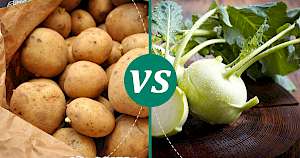Kohlrabi vs Potato: Nutrition & Calories Compare


Kohlrabi vs Potato
Nutrition Facts
Serving size:
change
5g10g15g20g30g40g50g60g80g100g120g140g160g180g200g220g250g300g350g400g450g500g600g700g800g900g1000g
1oz2oz3oz4oz5oz6oz7oz8oz10oz12oz15oz20oz25oz30oz35oz40oz50oz
Amount Per Serving:
Serving size:
change
5g10g15g20g30g40g50g60g80g100g120g140g160g180g200g220g250g300g350g400g450g500g600g700g800g900g1000g
1oz2oz3oz4oz5oz6oz7oz8oz10oz12oz15oz20oz25oz30oz35oz40oz50oz
Amount Per Serving:
Kohlrabi vs Potato 100g Compare
| per 100g | Kohlrabi | Potato |
|---|---|---|
| Calories | 27 | 77 |
| Carbohydrates | 6.2 g | 17.49 g |
| Fat | 0.1 g | 0.09 g |
| Dietary fiber | 3.6 g | 2.1 g |
| Protein | 1.7 g | 2.05 g |
| Calcium | 24 mg | 12 mg |
| Iron | 0.4 mg | 0.81 mg |
| Magnessium | 19 mg | 23 mg |
| Potassium | 350 mg | 425 mg |
| Sodium | 20 mg | 6 mg |
| Vitaminium A | 36 µg | 2 µg |
| Vitaminium B1 (Thiamine) | 0.05 mg | 0.081 mg |
| Vitaminium B2 (riboflavin) | 0.02 mg | 0.032 mg |
| Vitaminium B3 (Niacin) | 0.4 mg | 1.061 mg |
| Vitaminium B5 | 0.165 mg | 0.279 mg |
| Vitaminium B6 | 0.15 mg | 0.298 mg |
| Vitaminium B9 (Folic acid) | 16 mg | 0.015 mg |
| Vitaminium C | 62 mg | 19.7 mg |
| Vitaminium K | 0.1 µg | 0.002 µg |
| Beta karoten | 22 mg | 4 mg |
A Closer Look at Kohlrabi and Potato
When considering the vast array of vegetables available to us, kohlrabi and potatoes often emerge as popular choices for their unique flavors and nutritional benefits. Kohlrabi, with its crisp, slightly sweet flavor, is a lesser-known gem in the vegetable kingdom. Originating from the same family as cabbage and broccoli, it can be eaten raw or cooked, offering versatility in the kitchen. On the other hand, potatoes have long been a staple in many diets around the world, revered for their comforting texture and ability to absorb flavors beautifully.
Nutritional Insights: Kohlrabi vs. Potato
Comparing kohlrabi and potatoes side by side reveals interesting nutritional differences and similarities. For those monitoring their calorie intake, kohlrabi stands out with significantly fewer calories, containing only 27 calories per 100 grams compared to potatoes' 77 calories. This makes kohlrabi an excellent choice for weight management or for those looking to consume a higher volume of food with fewer calories.
Carbohydrates play a crucial role in our diet, providing us with energy. Kohlrabi has about 6.2 grams of carbs, while potatoes offer a higher amount with 17.49 grams. However, kohlrabi compensates with a higher fiber content of 3.6 grams, compared to potatoes' 2.1 grams, promoting better digestion and satiety.
Both vegetables are low in fat, each containing just 0.1 grams of fat, making them excellent additions to a heart-healthy diet. When it comes to protein, potatoes slightly edge out kohlrabi with 2.05 grams of protein versus kohlrabi's 1.7 grams, though both are relatively low in this macronutrient.
Minerals and Vitamins: A Comparative View
The mineral and vitamin content of kohlrabi and potatoes further highlights their nutritional value. Kohlrabi offers a good source of calcium with 24 mg, doubling the amount found in potatoes. However, potatoes contain more iron and magnesium, which are essential for blood health and muscle function, respectively.
One of the standout features of kohlrabi is its vitamin C content, boasting 62 mg compared to the 19.7 mg found in potatoes, making it an excellent choice for immune support and skin health. Kohlrabi also provides modest amounts of vitamins A, B, and K, which are crucial for vision, energy production, and blood clotting.
Choosing Between Kohlrabi and Potato
The choice between kohlrabi and potato depends on personal health goals and dietary preferences. Kohlrabi, with its lower calorie and higher fiber content, may be the better option for those looking to lose weight or maintain a healthy weight. Its high vitamin C content also makes it a great choice for boosting the immune system.
Potatoes, on the other hand, are a comforting and versatile vegetable that can be a healthy part of the diet when prepared in a health-conscious manner. They offer slightly more protein and are a good source of iron and magnesium.
Ultimately, both kohlrabi and potatoes can play a beneficial role in a balanced diet, offering a range of nutrients that support overall health. By understanding the nutritional profile of these vegetables, you can make informed choices that align with your dietary needs and preferences.
Kohlrabi 100g
27kcalCalories source
- 76% CARBS.
- 21% PROTEIN
- 3% FAT
Potato 100g
77kcalCalories source
- 89% CARBS
- 10% PROTEIN
- 1% FAT
Compares of kohlrabi
- Kohlrabi vs Beetroot
- Kohlrabi vs Bok Choy
- Kohlrabi vs Broccoli
- Kohlrabi vs Cabbage
- Kohlrabi vs Carrot
- Kohlrabi vs Cauliflower
- see all compares of kohlrabi
Marcin Piotrowicz
calories-info.com creator
Healthy diet and healthy lifestyle promoter
Add comment